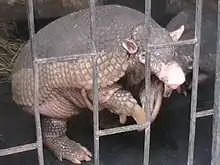| Tolypeutinae[1] Temporal range: Late Oligocene to present | |
|---|---|
 | |
| Captive giant armadillo in Colombia | |
| Scientific classification | |
| Domain: | Eukaryota |
| Kingdom: | Animalia |
| Phylum: | Chordata |
| Class: | Mammalia |
| Order: | Cingulata |
| Family: | Chlamyphoridae |
| Subfamily: | Tolypeutinae Gray, 1865 |
| Genera | |
| |
Tolypeutinae is a subfamily of armadillos in the family Chlamyphoridae, consisting of the giant, three-banded and naked-tailed armadillos.[2][3][4]
Taxonomy
It contains the following genera:[5]
- Cabassous
- †Kuntinaru[6]
- Priodontes
- Tolypeutes
- †Vetelia[7]
Phylogeny
Tolypeutinae is the sister group of Chlamyphorinae, the fairy armadillos, as shown below.
| Cladogram[4][8][3] | |||||||||||||||||||||||||||||||||||||||||||||||||||||||||||||||||||||||||||||||||||||||||||||
|
References
- ↑ Gardner, A. (2005). Wilson, D.E.; Reeder, D.M. (eds.). Mammal Species of the World: A Taxonomic and Geographic Reference (3rd ed.). Johns Hopkins University Press. pp. 94–95. ISBN 978-0-8018-8221-0. OCLC 62265494.
- ↑ Moller-Krull, M.; Delsuc, F.; Churakov, G.; Marker, C.; Superina, M.; Brosius, J.; Douzery, E. J. P.; Schmitz, J. (November 2007). "Retroposed Elements and Their Flanking Regions Resolve the Evolutionary History of Xenarthran Mammals (Armadillos, Anteaters, and Sloths)". Mol. Biol. Evol. 24 (11): 2573–2582. doi:10.1093/molbev/msm201. PMID 17884827.
- 1 2 Gibb, G. C.; Condamine, F. L.; Kuch, M.; Enk, J.; Moraes-Barros, N.; Superina, M.; Poinar, H. N.; Delsuc, F. (2015-11-09). "Shotgun Mitogenomics Provides a Reference Phylogenetic Framework and Timescale for Living Xenarthrans". Molecular Biology and Evolution. 33 (3): 621–642. doi:10.1093/molbev/msv250. PMC 4760074. PMID 26556496.
- 1 2 Delsuc, F.; Gibb, G. C.; Kuch, M.; Billet, G.; Hautier, L.; Southon, J.; Rouillard, J.-M.; Fernicola, J. C.; Vizcaíno, S. F.; MacPhee, R. D. E.; Poinar, H. N. (2016-02-22). "The phylogenetic affinities of the extinct glyptodonts". Current Biology. 26 (4): R155–R156. doi:10.1016/j.cub.2016.01.039. PMID 26906483.
- ↑ "Tolypeutinae". Integrated Taxonomic Information System. Retrieved 18 March 2011.
- ↑ Guillaume Billet; Lionel Hautier; Christian de Muizon & Xavier Valentin (2011). "Oldest cingulate skulls provide congruence between morphological and molecular scenarios of armadillo evolution". Proceedings of the Royal Society. 278 (1719): 2791–2797. doi:10.1098/rspb.2010.2443. PMC 3145180. PMID 21288952.
- ↑ Barasoain, Daniel; González Ruiz, Laureano; Tomassini, Rodrigo; Zurita, Alfredo; Contreras, Víctor; Montalvo, Claudia (2021). "First phylogenetic analysis of the Miocene armadillo Vetelia reveals novel affinities with Tolypeutinae". Acta Palaeontologica Polonica. 66 (3). doi:10.4202/app.00829.2020. hdl:11336/136645.
- ↑ Upham, Nathan S.; Esselstyn, Jacob A.; Jetz, Walter (2019). "Inferring the mammal tree: Species-level sets of phylogenies for questions in ecology, evolution and conservation". PLOS Biol. 17 (12): e3000494. doi:10.1371/journal.pbio.3000494. PMC 6892540. PMID 31800571.
This article is issued from Wikipedia. The text is licensed under Creative Commons - Attribution - Sharealike. Additional terms may apply for the media files.